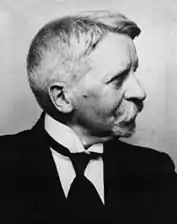
Charles Andler
Charles Philippe Théodore Andler (11 March 1866, Strasbourg – 1 April 1933, Malesherbes, Loiret) was a French Germanist and philosopher.
Life
Andler was born to a Protestant family in Strasbourg.[1] In 1887 and 1888, Andler failed to achieve his agrégation in philosophy, judged by Jules Lachelier, inspector-general in charge of philosophy, as showing "excessive bias" towards German philosophy. He therefore changed to take the German literature agrégation in 1889, passing out top of his class.[2] Andler became professor of German at the Sorbonne in 1901 and at the Collège de France in 1926. Amongst his works were writings on Nietzsche, a commentary on The Communist Manifesto, and a life of his friend Lucien Herr.
Works
- Les origines du socialisme d'état en Allemagne, 1897 – The origins of state socialism in Germany.
- Collection de Documents sur le Pangermanisme, 4 vols, 1915–1917 – Collection of documents on Pan-Germanism.
- Nietzsche, sa vie et sa pensée, 6 vols, 1920 – Nietzsche, his life and thinking.
- Vie de Lucien Herr (1864-1926), 1932 – The life of Lucien Herr.
References
Further reading
- Ernest Tonnelat, Charles Andler: sa vie et son œuvre, 1937
This article is issued from Wikipedia. The text is licensed under Creative Commons - Attribution - Sharealike. Additional terms may apply for the media files.